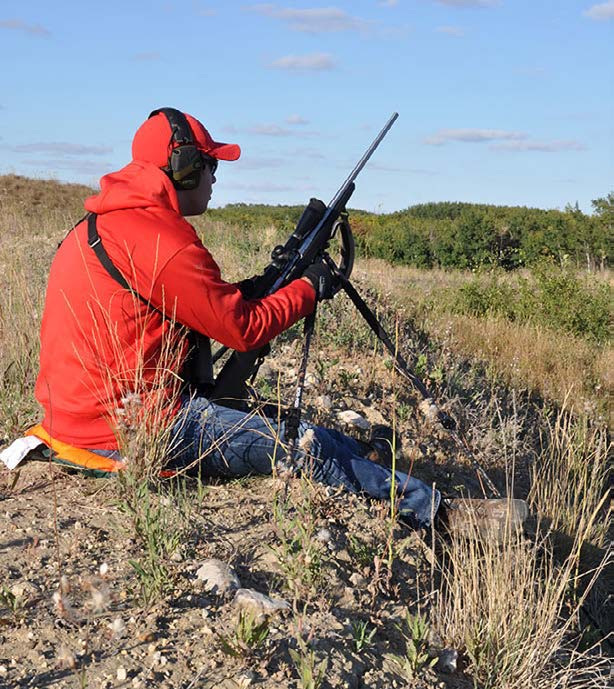There are no guarantees in elk hunting!
Well, there may be just one—the guarantee being that elk hunting is extremely emotional. When you hunt elk, you quickly learn that elk hunting comes with a series of highs and lows, whether they occur over the course of a day in the field or even over the course of a season. There are times when your emotions will top out at the max or drop down so low that you’re tripping on them.
Some might say that such emotional swings can’t be good. However, that’s not the case with elk hunting. The beauty of these emotions is that the highs keep you so interested and mesmerized in hunting elk that you want to do that as much as you possibly can. As for the lows, they generally crush your spirits— temporarily! Once you get over the initial emotional pain, you’ll realize that you learned a lesson, or were oh-so-close, and your determination to succeed takes over, providing you with new-found information. And, away you go back to elk hunting!
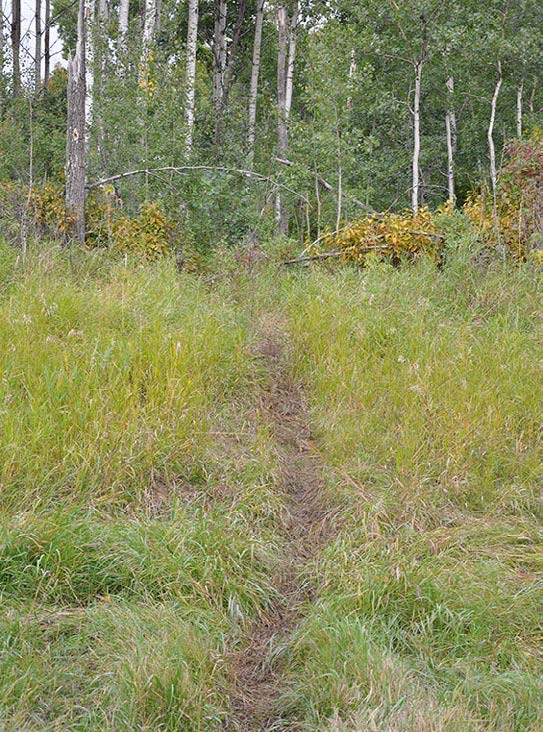
Being in Elk Country
A hunt in elk country is good for the soul. The sights, sounds and smells of the woods are enough to make a person feel great and to have their emotions rise just from being in that environment. This situation motivates you to get up early so you can be in position to hear a bugle as the sun rises or catch elk returning to the forest after spending the night feeding in meadows or agricultural fields.
With the anticipation of hearing, seeing and harvesting an elk, your mind and body are motivated to hunt all day long. This often results in you walking longer and farther than you normally would. During those times, you think nothing of staying and looking over a meadow knowing you will have a long walk out in the dark.
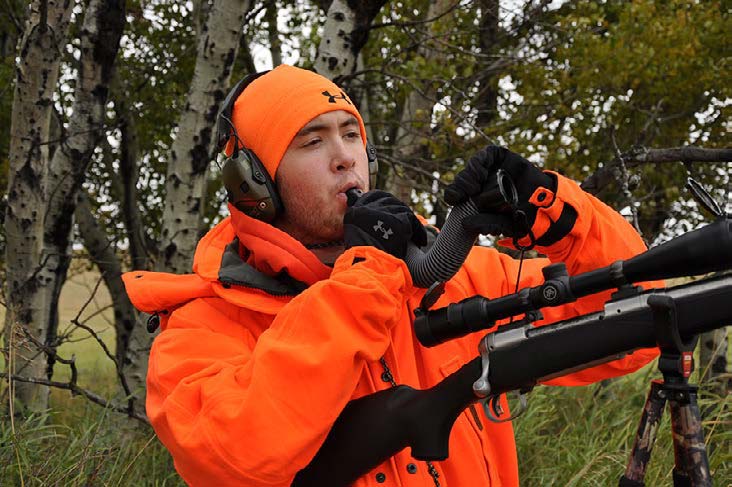
Pushing yourself to the limits in elk country comes with a price. Mosquitoes, chiggers and black flies find elk hunters tasty. Their bites often result in swollen and itchy skin and even painful spots on our hands and faces. Sometimes, walking in the up-and-down rough terrain of elk country makes us realize how physically out of shape we are, causing stiff joints, sore muscles or blisters on our feet.
Those mid-day sore feet and tired bodies often make us feel sorry for ourselves. To help soothe the pain of it all, elk hunters often sit down mid-day in the comfortable shade of a big tree. I don’t know about you, but many times when I’ve sat down to take a rest and motivate myself to keep on slugging, I find myself nodding off for a midafternoon forest nap. Once I have that little nap, I awaken refreshed and with newfound optimism.
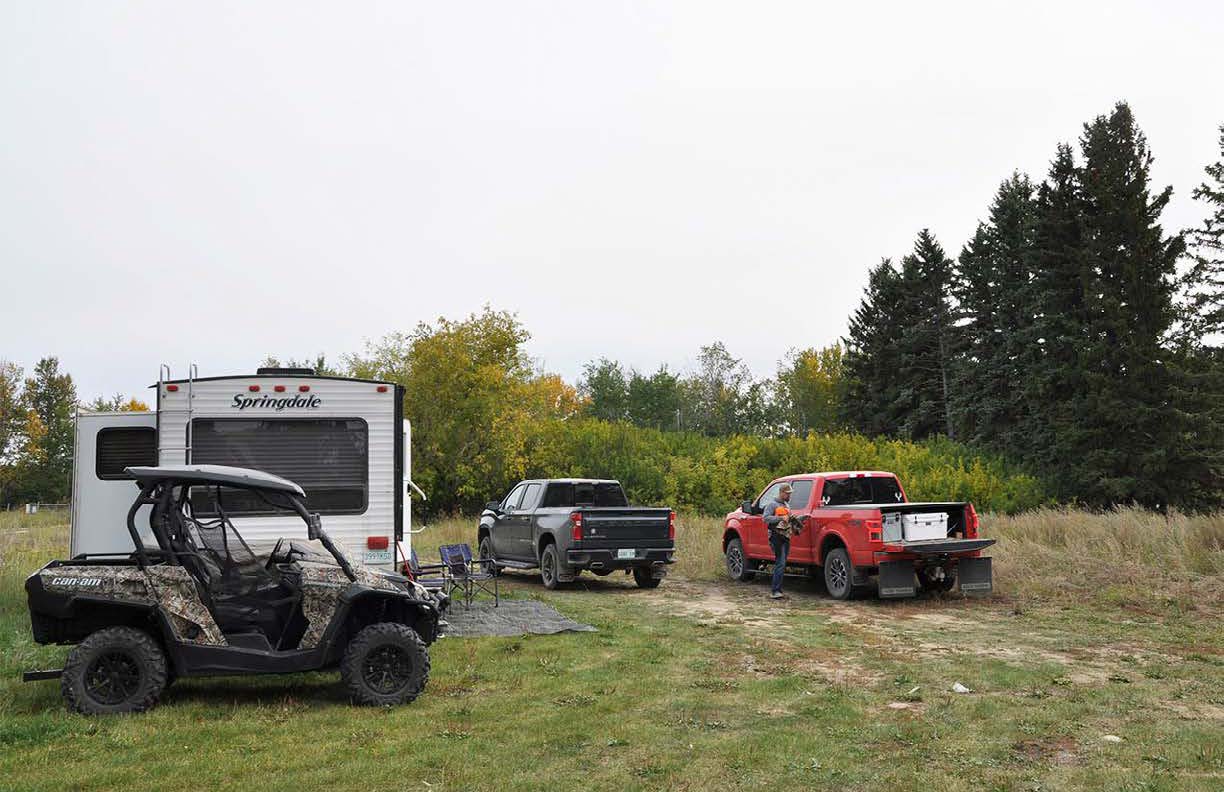
Beautiful, and Harsh
For as beautiful as elk country can be, it can also be a harsh and unforgiving environment. Unexpected rain or snow can quickly spoil a day and make you uncomfortable if you get caught in a storm and must head back to camp soaking wet.
Being stuck in your tent or camper for several days in a row due to nasty weather, such an early- season blizzard, can also really dampen your spirits and bring you down. It’s not just cold weather that can spoil your elk hunt. The temperatures can also be unseasonally hot. That type of weather turns elk nocturnal and pushes them into the deepest valleys and thickest swamps to stay cool.
Wind can be an elk hunter’s worst enemy. At times the wind will swirl and spook the elk. On other occasions, the wind will be so strong it prevents you from hearing any elk calls. But then, when you get a crisp calm morning, you are pumped to hear an elk bugle.
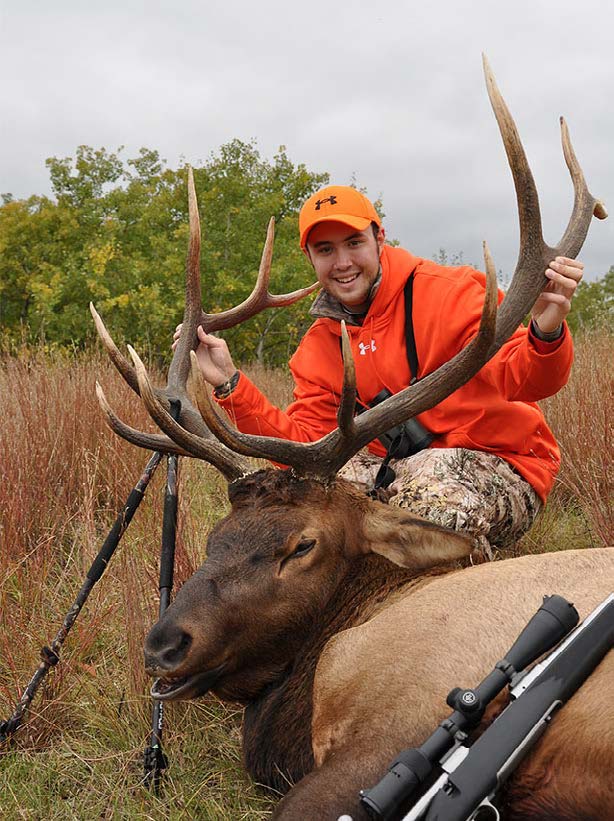
Elk Calling
Elk are so fun to hunt because they are vocal animals, especially during the rut. They are so vocal that you can hear them call, and they often will call back to you. At times, elk will even come to you on a string as you call to them.
When you head afield and hear a bugle, the hair on your neck will often stand on end. The shrill bugle triggers thoughts of an exciting hunt to come. No matter how many times this has happened in the past, chances are you will excitedly fumble for your bugle so you can bugle back at the calling bull. In fact, even seasoned, hard-core elk veterans will often start shaking with excitement and anticipation of what’s to come at these sounds.
If you let out the perfect bugle, the emotions will continue to skyrocket as you wait for a reply from the elk. If the elk bugles back right away, the high continues. If the elk doesn’t call back, then you start to question your calling ability and your excitement level fades. Then suddenly, the elk bugles again and its closer location causes the emotional high to continue to grow. However, if the elk bugles and is further away, your spirits may dwindle. In those low-spirit times, your brain tells you that the opportunity may not be over if you start chasing that bull with the hopes he stops and turns around to fight.
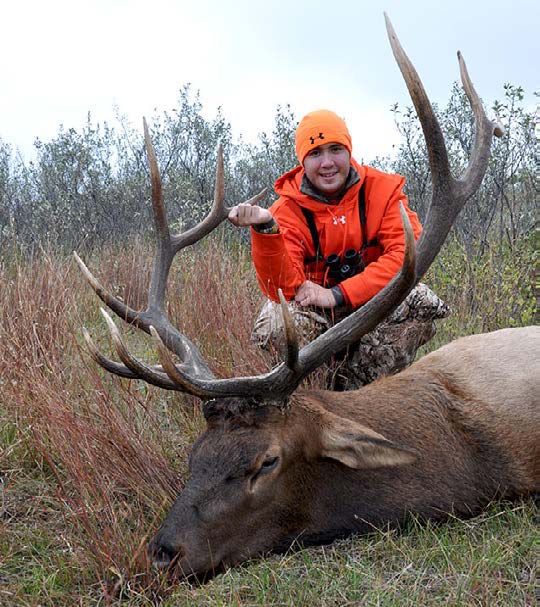
A Bad Call
In the event that your response to the calling bull is less than perfect and comes out with the wrong pitch, chuckle or squeal, your emotions can quickly drop off, and you can become frustrated with your calling mistake. Once you shake it off, chances are you’ll start to get better vibes that the bull you spooked with your call isn’t the only bull in the forest. You might find there is another one calling soon, and your next call will be much better as you will strive to project that call perfectly.
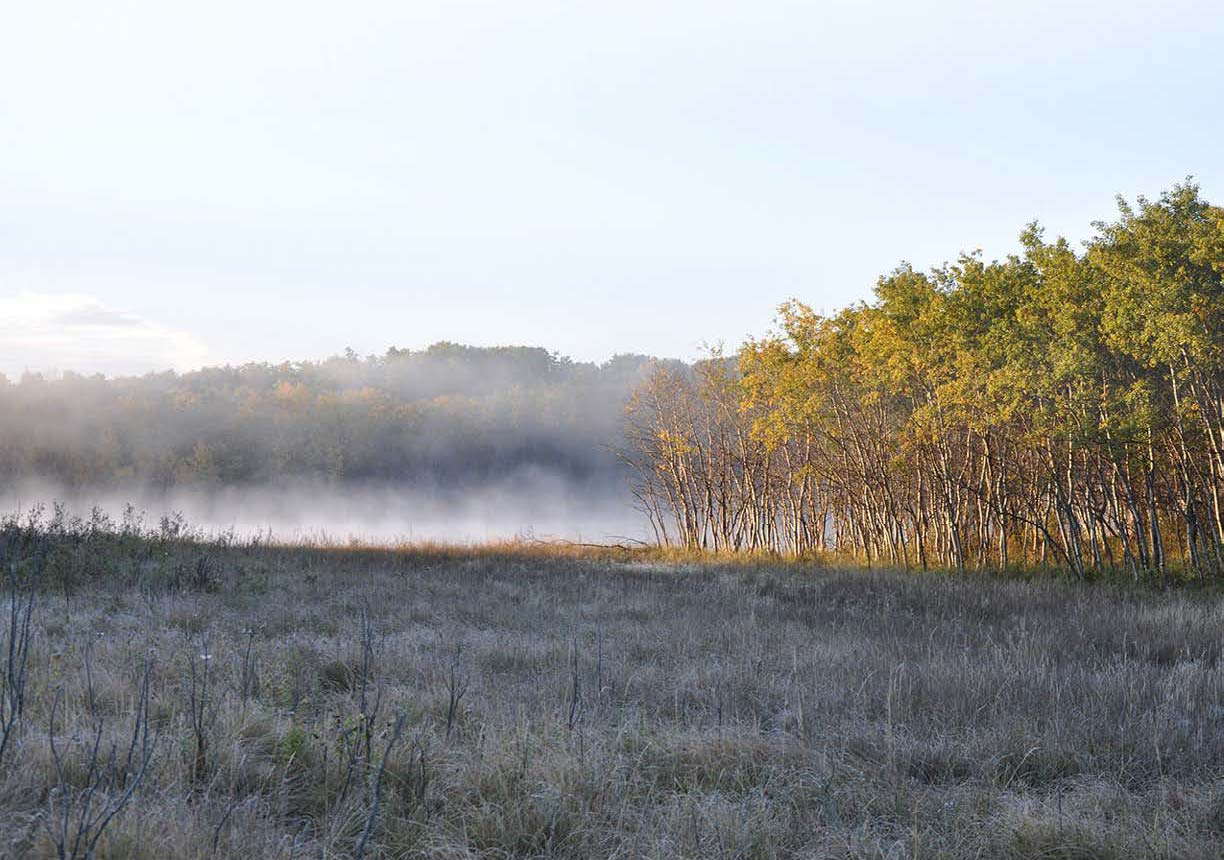
Cow Calls Too
It’s not just bull calls that can trigger excitement, because elk cows call, too. A couple years ago while bugling back and forth with a bull elk, it was looking like we were in a stalemate. While waiting for the bull to respond and trying to come up with a plan that might get me closer to the bull, a cow elk call broke the silence. Not only did it break the silence, it startled the daylights out of me because the call was super loud. It turned out that it came from within the small bluff of trees I was standing alongside.
Moments later, when the cow stepped out in front of me less than 50 yards away, my heart was racing. When two bulls appeared broadside behind her, my heart almost popped out of my chest. Somehow in all that excitement I managed to get the crosshairs on the chest of the bigger bull and send a Winchester 180 grain Expedition Big Game 30.06 bullet into his vitals
Then again, not all cow calls can make the heart pound with anticipation and excitement. There are times when you know you are close to a herd of elk and something happens. There’s a wind shift, or you snap a twig, or you clank your binoculars on your rifle and a cow barks—sending the entire herd elsewhere—and your emotions to the basement! After the pounding hoof beats and breaking bushes stop, you will try to assess what happened, learn from that and strive to do better on the next encounter.
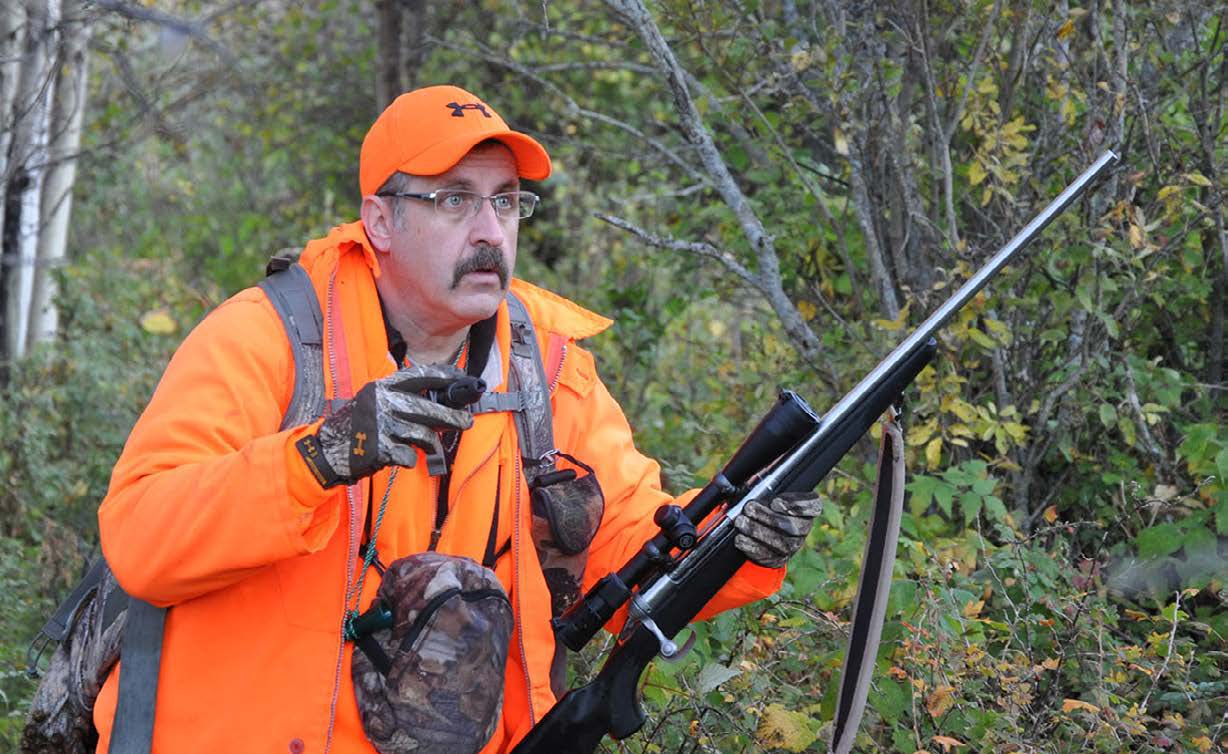
Here Comes the Elk
I’ll never forget the first time I had a bull elk coming to my calls. I was young and naïve and that elk was calling and moving closer at a rapid pace. I figured it was a sure thing. It was late afternoon and while walking down a trail in the forest, I would periodically stop and bugle. After three or four bugle stops, I finally got the bull to bugle back to me. Each time he would call, I would call back at him, and he would return the call almost instantly. With each returning call, his calls became louder and louder. He was closing distance quickly. He was on a mission to find me. In anticipation of his arrival, I stepped off the trail and hid in the underbrush so I could see out, but so he wouldn’t be able to see me.
In short order, he was in the tall thick hazel brush on the opposite side of the trail from where I was hiding. Unfortunately, all I could see were the tips of his antlers, and there was no shooting opportunity.
I tried to move to the left and then to the right to try to find an opening for a clear shot. At the same time, he would also move and try to spot me. I just couldn’t see him and although he was moving around, he refused to step into the open. During this time, I could hear him breathing, hear his hooves trampling the underbrush, and hear his antlers thrashing the trees. I’m sure he heard my pounding heart and that’s why he left in a flash. That caused me to become instantly deflated and disappointed with an unused tag in my pocket.
Although I never got that bull, the sheer excitement of that encounter far outweighed the heartbreak of the moment when he fled. Without a doubt, the entire sequence of emotions on that hunt is a huge contributing factor to why I love elk hunting.
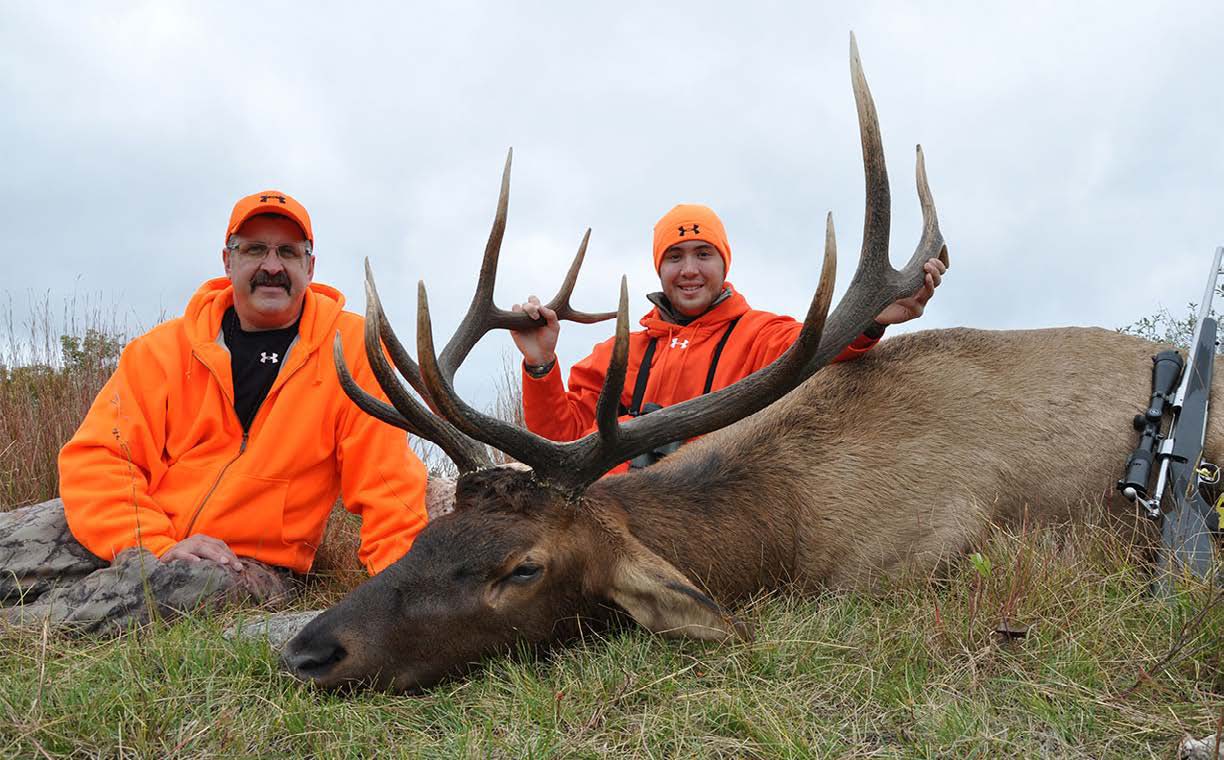
Aggressive Responder
On another occasion a few years later in the same area, while calling from a tree stand, I had a response from a bull after my first bugle. Game on! The bull was extremely aggressive and kept on responding to my calls. With each bugle, I could tell he was getting closer and closer. Given my elevated position, I was confident I was going to see this bull and fill my tag.
Suddenly a branch snapped and all my attention was focused on the source of that sound. With a pounding heart I scanned the area and glared into the underbrush. Then a flash of motion caught my eye and my emotions went from super high to super low! Sneaking through the brush was another hunter with an elk bugle in hand! After identifying myself to him, I’m not sure who was more disappointed, but either way, we both got a chuckle out of the event.
Imagine just getting ready to pull the trigger on a nice 5X5 bull elk standing directly broadside with a couple of cows when a big 6X6 bull comes charging across the meadow towards the elk in front of you. Well, that’s what happened to my son and I one afternoon. Naturally, the focus turned to the big 6X6 and Kyle got ready for him to get into shooting range.
The smaller bull also saw the big bull and wanted no part of the big bull. The 5X5 took off running. The big bull changed course and took off after the smaller bull. At the same time, the cows slowly disappeared in the opposite direction. So, there we stood, watching the two bulls run out of sight. And just like that, we couldn’t see any elk, where mere seconds before that Kyle was going to seal the deal on a nice bull.
In a state of sheer shock and disappointment, we just stood there in silence trying to comprehend what had just happened. As we were chalking things up to another unsuccessful close encounter of the elk kind the big bull reappeared in the exact spot where we had last seen him running away. Instead of running, he was now lumbering back towards us and to where the cows had been.
It didn’t take long and the big bull was getting close to same area where the smaller bull and cows had been standing. The big bull stopped and froze for a moment. He then lifted his nose and did a lip curl. That was an impressive sight to behold! Then, he trotted ahead and stopped again. As soon as he stopped, Kyle pounded a bullet into the bull’s vitals.
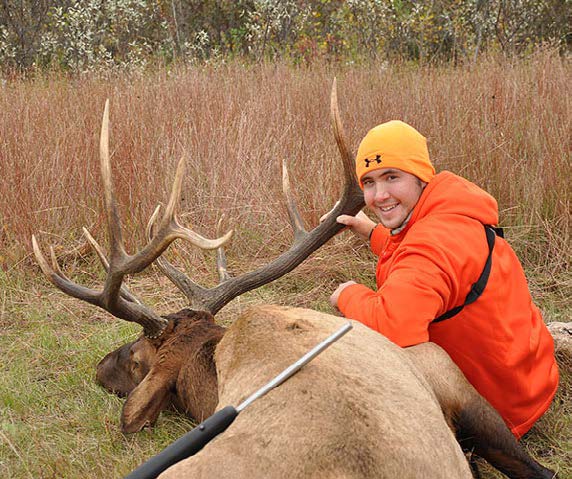
Success
Walking up to an elk that you’ve harvested is an incredible feeling. It is truly an accomplishment to be proud of and makes one feel both excited and happy. The simple process of notching your tag can continue to make the emotions rise and bring sheer happiness about the success. It can also bring sadness that the quest for an elk is over.
When you lift the head and antlers to hold up for a picture, your adrenaline kicks in as you realize how heavy the head, neck and antlers are. After a few pictures, it’s field dressing time, and this is where the emotions can plummet. Elk are big animals and often it’s hard for one or two hunters to roll over or move the elk. In addition, elk are often shot in the roughest of rough terrain or in open meadows. Each of these scenarios presents its own unique set of field dressing and retrieval challenges.
I’ve been in these situations before. At times, the thought and process of rolling a bull over, field dressing him and getting him out of the field and into \a cooler as you race against darkness or daytime heating can drag you right down. In those lowest of moments where you think there is no physical way to get the task done, we somehow get resourceful. We seem to discover superpowers or find out that we have skills and abilities we never knew existed. In the end, we get our elk cleaned and loaded up, leaving us with a huge sense of pride and accomplishment.
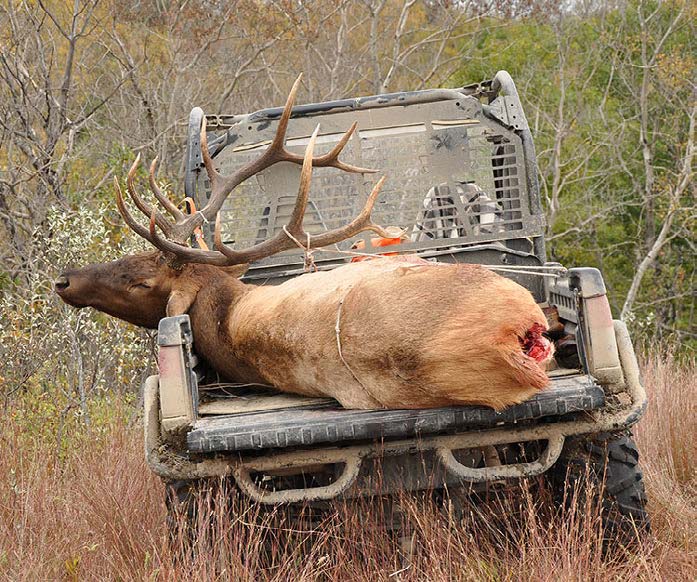
Once at Home
Elk meat makes fine table fare. Feeding family and friends prime organic meat makes us feel good. Plus, an elk burger, smoked roast or barbequed steak is delicious and healthy. A freezer full of meat is a beautiful sight. However, there will come a day when you eat the last package of elk meat and at that point, your spirits drop.
Then as you walk away from the freezer and spot a set of mounted elk antlers or a head mount hanging on the wall, your thoughts quickly turn to planning next year’s hunt and reliving hunts of the past.
At the end of the day, I have to say that I love elk hunting and all the emotions that come with chasing the ghosts of the forest. Regardless of whether I must head home because I filled my elk tag, the season ended or my hunt ran out of time, I always feel a sense of remorse and sadness to leave elk camp and return home. Thankfully, the sadness doesn’t last long, because almost immediately, I start to think of when I can return, what new gear I need to get, what equipment might need fixing and what I might be able to leave at home the next time around. The hope for the next hunting adventure brings excitement that will last until I start packing and head out the door and out into elk country again.
Per our affiliate disclosure, we may earn revenue from the products available on this page. To learn more about how we test gear, click here.



